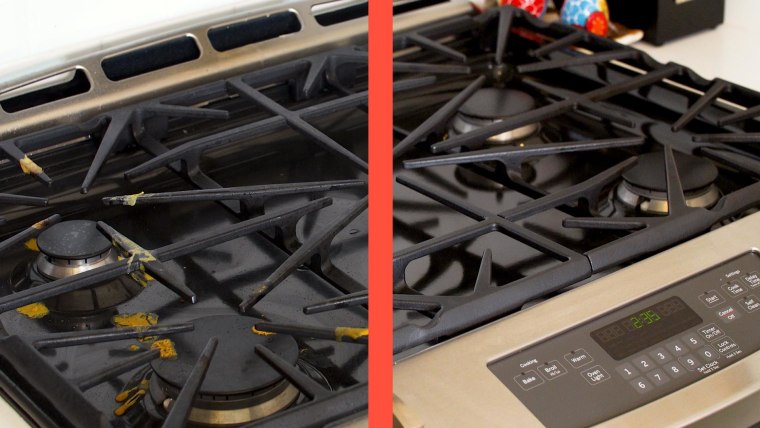How To Clean An Electric Teapot
Whether it's gas, electric or even glass, it takes more than a halfhearted promise to really clean a messy stove top in one day.
TODAY Home asked Meg Roberts, president of Molly Maid cleaning services, to share her expert tips for this kitchen chore. As a pro, she recommends cleaning stove tops immediately after cooking so it's before spills and splatters harden.

Follow her advice for cleaning any type of stove top — whether its glass, gas or an electric stove.
How to clean a gas stove top, stove burners and stove grates:
Supplies:
- Microfiber cloths, dish towels, or a sponge
- Baking soda
- Vinegar
- Dish soap
Instructions:
To start, remove the grates and burner caps from the stovetop and let them soak in hot, soapy water for 10 minutes. While they're soaking, make a paste of baking soda and water.
After the ten minutes are up, take the grates out of the water and apply the paste, focusing on any tough spots. Let the paste sit for at least 30 minutes.
While this is happening, sprinkle some baking soda onto the stove cooktop and spray it with vinegar. Let sit for fifteen minutes.
Use a damp sponge or cloth to wipe the paste off the grates and burner caps. Do the same for the cooktop!
To wrap up, just put everything back in its place and get ready to start cooking again!
When fuel ports become dirty and clogged, and automatic igniters lose their spark, Roberts recommends calling an appliance professional, since pros know how to safely and effectively remove debris on these delicate parts. They also know how to adjust burners so they burn with a blue flame. (Orange/yellow flames indicate poor combustion and require attention.)

How to clean an electric stove top:
Supplies:
- Microfiber cloths
- Mild grease-busting dish detergent
- A sponge
Instructions:
Wipe coils with a damp microfiber cloth. If burned-on residue remains on the coils, burn it off by turning the heat on high. (This can get smoky, so turn on the exhaust fan, too.)
Clean reflector pans with a mild grease-busting dish detergent, such as Dawn, hot water and a microfiber cloth.
Check out the area under the cooktop for food and spills. Wipe the area clean with a damp sponge. Use soapy water if needed.
How to clean a glass stove top:
Supplies:
- Microfiber cloths
- Mild grease-busting dish detergent
- A sponge
Instructions:
Allow the burner to completely cool before you do anything. Remove any debris from the burner with a silicone or plastic spatula. Roberts prefers spatulas for this task as they are flexible and safe. Single edge razor blades or anything else sharp may scratch the glass- top surface.
To remove burned-on food and stains, Roberts suggests using baking soda. Sprinkle baking soda directly over the stained area and add a bit of water to make a paste. Leave a warm, damp cloth on top of the spot and let it sit for 30 minutes. Then try to wipe the spot clean.
If the spot is really stubborn, add a few drops of distilled white vinegar to the baking soda. That should do the trick.
If you prefer to purchase a product to keep your glass stovetop clean and polished, consider liquid Bar Keepers Friend, which is available at most superstores and at Amazon.
Warning: Some people use white eraser sponges for extremely tough burn marks. These do work, but Roberts advises that you use with caution as this substance is like microfine sandpaper and can scratch the surface if you're not careful.
Using interviews with specialists, online reviews and personal experience, TODAY editors, writers and experts take care to recommend items we really like and hope you'll enjoy! TODAY does have affiliate relationships with various online retailers. So, while every product is independently selected, if you buy something through our links, we may get a small share of the revenue.
This article was originally published on TODAY.com on November 24, 2017.
How To Clean An Electric Teapot
Source: https://www.today.com/home/how-clean-cooktop-or-stovetop-t118762
Posted by: stantonexpon1997.blogspot.com

0 Response to "How To Clean An Electric Teapot"
Post a Comment